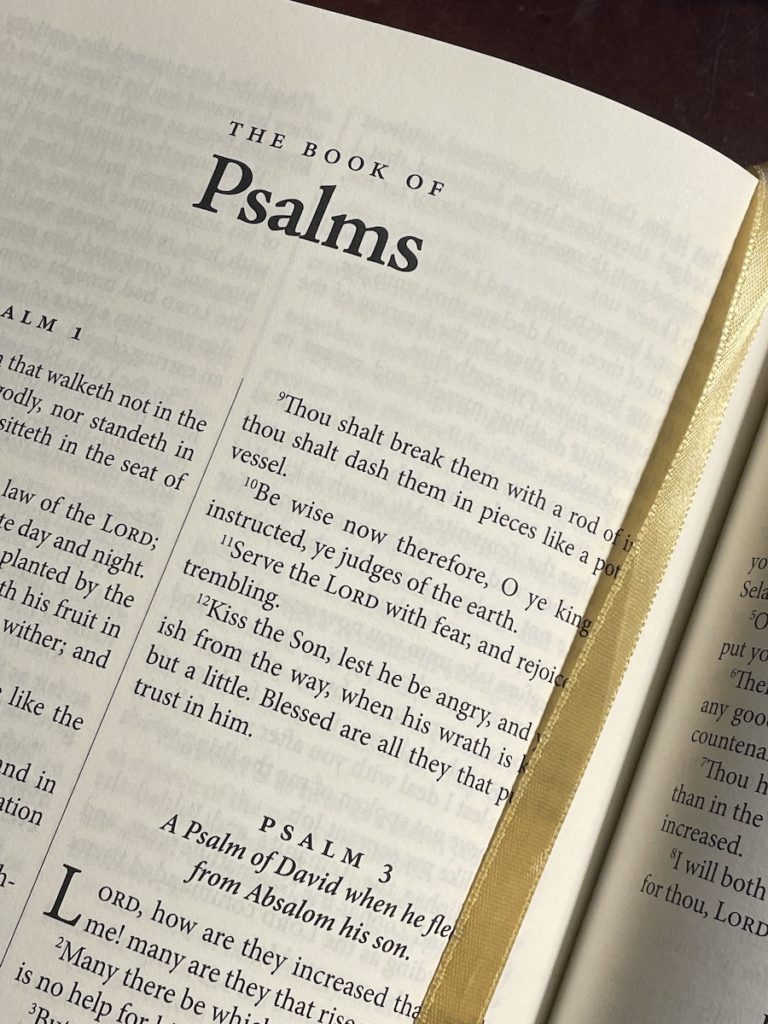
Psalm 35
Psalm 35:1–28, An imprecatory psalm. Although this psalm contains several imprecatory passages where David curses his enemies (see vv. 1–5, 8, 26), he does so while pleading for justice by appealing to Elohim—his righteous Heavenly Judge. Vengeance belongs only to Elohim, not to man, for man’s vengeance is too often tainted by one’s own carnality, whereas YHVH’s justice is perfect and just. In the mean time, David humbles himself before Elohim (vv. 13–14), and, at the same time, gives himself over to worshipping his Creator (vv. 18, 27–28). This is a far cry from taking matters into one’s own hands and “going after” one’s enemies oneself. Simultaneously, David expresses hope in the fact that YHVH is his salvation (Heb. yeshua) (v. 3). This is a prophetic picture of Yeshua, the coming Messiah, who will ultimately deliver his people from all of their enemies including sin, death and the grave.

Psalm 35:3, 5–6, Salvation [Heb. Yeshua]…the Angel [Heb. Messenger] of YHVH. This notable passage connects the idea of the Angel [or Messenger] of YHVH, who makes appearances from time to time in the annals of the Tanakh, with Yeshua the Messiah who is “our salvation. From this passage, what could be clearer than the fact that the Messenger of YHVH was the pre-incarnate Yeshua? In verse 9, David again refers to Yeshua, YHVH’s Savior of mankind.
Psalm 35:9, His salvation [Heb. Yeshua]. This is another prophetic passage pointing to Yeshua as YHVH’s salvation for mankind. (See notes on Ps. 35:3, 5–6.)
Psalm 35:13, Humbled…fasting. The Hebrew word for humbled means “to afflict the soul.” This verse connects the concept of humbling, afflicting or suppressing the soul (i.e. one’s carnal mind, will and emotions) through fasting. This is so that one’s personal spirit can be energized, while simultaneously suppressing the carnal appetites and desires, thus enabling one to better to connect with and be directed by the Spirit of Elohim. (See notes on Isa 58.)
Psalm 35:27–28, Shout for joy…YHVH be magnified. Although this is an imprecatory psalm where David ostensibly curses his enemies, he is doing so through the aegis of Elohim and the courts of heaven. In the mean time, David is rejoicing in and worshipping the Almighty knowing that his fate is secure because YHVH is his Savior from his enemies. This is a far cry from taking matters into one’s own hands and through one’s own power and effort and avenging oneself of one’s enemies oneself. Instead, David fights his enemies through humility, fasting, prayer, praise and worship. This is not your typical method of battling against one’s enemies, to be sure! This is another example of how man’s ways are not the ways of Elohim.
Psalm 36
Psalm 36:1, An oracle [Heb. nah-oom] within my heart. Nahoom is from the verb meaning “to say or to whisper or, by implication, to utter an oracle.” The Spirit of YHVH will speak to a person from within their inner or personal spirit and give them divine revelation (see also Ps 13:2–3). This calls to mind Psalm 46:10, “Be still and know that I am Elohim,” or the still small voice of YHVH that Elijah heard in the entrance of the cave (1 Kgs 19:12; cp. Ps 4:4; Isa 8:6).
Psalm 36:7, Shadow of your wings. This is an example of poetic imagery or simile in the Bible. Obviously, YHVH Elohim is not a winged, bird-like creature. The Scriptures contain many such examples where metaphor and simile are employed as poetic devices to describe supernatural things such as the characteristics of Deity where human language lacks the verbiage and where-with-all to do so. Often, Bible students come up with novel interpretations and sometimes even silly of Scripture when they take biblical poetic imagery and attach a literal meaning to it. When one does this, they can almost make the Bible say anything they want.
Psalm 36:8–8, River…fountain of life…in Your light. When we are in Elohim’s river of life, it is a fountain of life to us, and when we are bathed in the light of YHHV’s divinely revealed Truth, we will see light or Truth (cp. Pss 18:28; 44:3).

